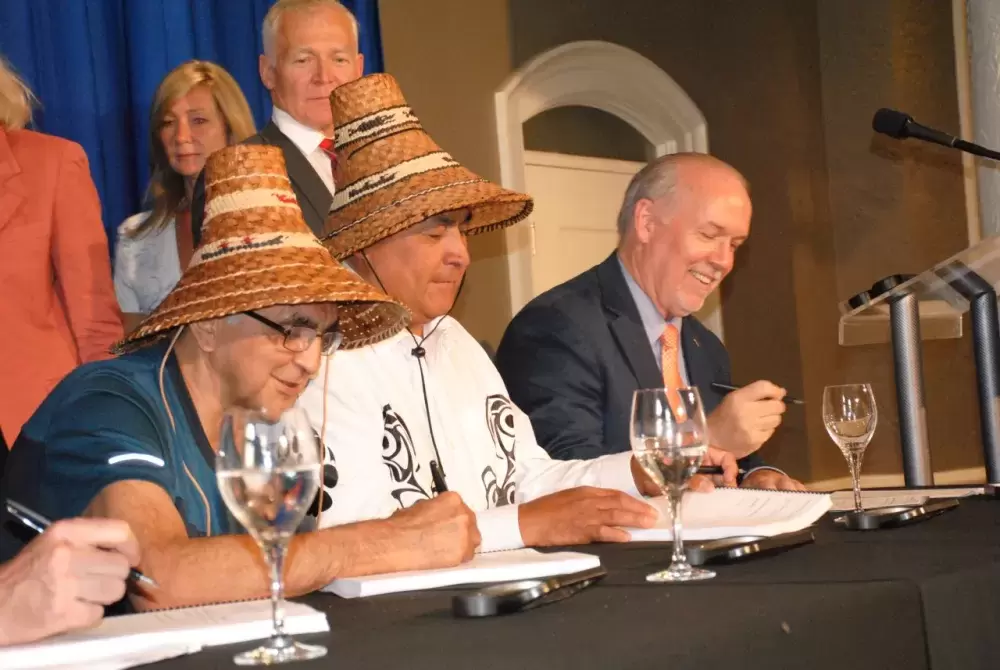The Ditidaht and Pacheedaht signed an agreement that has been a quarter century in the making today, setting the First Nations up for the final stages of treaty negotiations with the province and Canada.
Elected leaders inked a joint Agreement In Principle in Victoria, a document that includes the basis of separate treaty agreements for the two southern Nuu-chah-nulth nations. The agreement lays the groundwork for final treaty implementation, with attention to territorial rights and obligations, as well as interests in land and waters that are formally recognized by Canadian law.
On the traditional territory of the Songhees and Esquimalt Nations, the AIP was signed by Premier John Horgan, federal Member of Parliament John Aldag (on behalf of Minister of Crown-Indigenous Relations Carolyn Bennett), Ditidaht Chief Councillor Robert Joseph and Jeff Jones, chief councillor of the Pacheedaht First Nation.
“This Agreement In Principle is a milestone,” said Jones before signing the AIP. “For Pacheedaht, it began when Europeans first visited our home on the west coast of Vancouver Island. It has not been an easy journey since settlers first arrived in our lands.”
“Like other nations across the West Coast of Canada, we have faced hardship,” continued the chief councillor. “Despite this all, we decided to take a new relationship with the Crown through the treaty process.”
At its current stage, the treaty proposes almost $20 in capital transfers to Pacheedaht and nearly $40 million to Ditidaht that would be paid upon implementation of the agreement, plus respective economic development funds of $1.8 and $3 million. Pacheedaht has approximately 280 members, while Ditidaht numbers 770.
The proposed treaty land entails the nation’s existing reserves, plus areas to be transferred from Crown land and the Pacific Rim National Park Reserve. For the Pacheedaht this would include 175.9 hectares of reserve land, plus 1,593 of provincial Crown area and another 128 hectares transferred from the national park to the First Nation. The Ditidaht are set to own its 751 hectares of reserve land, almost 4,000 hectares of Crown land and 1,453 hectares of national park land in the southeastern portion of Vancouver Island.
The province has also pledged to establish a 54-kilometre gravel forest road from Cowichan Lake to the end of Nitinaht Lake to benefit the Ditidaht community.
Joseph has been involved in treaty negotiations for the Ditidaht for decades. He foresees his nation becoming more empowered to economically benefit from its land if a treaty is implemented.
“If you own everything and you can’t develop your economy, you’re wasting your time,” said Joseph, who expects the treaty could have an influence on other Aboriginal communities. “We would be negotiating things that would ultimately be extended to all First Nations, because we’re starting to wake people up.”
During the event, which was held at Victoria’s prestigious Empress Hotel, speakers noted that the nations never agreed to the establishment of the West Coast Trail when it was added to the region’s national park in 1973. After the nations’ territory was restricted, Canada made a land cash offer in 1979, but this was rejected by the Pacheedaht and Ditidaht.
“It was crazy. Nobody in their right mind would accept that,” recalled Joseph of the offer. “It was basically shoved down our throats. We didn’t have any input into it.”
The Pacheedaht first filed their statement of intent to explore a modern-day treaty in 1996, while the Ditidaht’s submission was made in 1993. Joseph said that his nation made progress when their negotiators decided to abandon a “combative” approach.
“For a good decade and a half we were drawing lines in the sand and saying, ‘This is our position, what’s yours?’ That’s combative and it doesn’t solve any problems,” he said. “Let’s be part of the process and you won’t have to consult with us.”
He expects it could take another three years to work out a final agreement, but a number of issues remain to be settled with the province and Canada, including the how fisheries rights will be recognized.
“The first thing we want to do is have a meaningful role in fisheries stewardship,” Joseph said. “Resulting from our own action, we would have access to more fish, that’s our vision. We have to find a way to protect that.”
Three modern-day treaties have been implemented in British Columbia, including the Maa-nulth Final Agreement, which took effect April 1, 2011 for the Huu-ay-aht, Uchucklesaht, Toquaht, Yuułuʔiłʔatḥ and Ka:'yu:'k't'h'/Che:k'tles7et'h' First Nations.







